نقد و بررسی
مبانی نظری و پیشینه پژوهش اعتماد سازمانی با منابع 2024-2025فهرست مطالب:
- مفهوم اعتماد و اعتماد سازمانی
- راهکارهای افزایش اعتماد سازمانی
- مفاهیم مشابه با اعتماد سازمانی
- اعتماد سازمانی و مثلث اعتماد
- ابعاد اعتماد از دیدگاه دایتز و هارتوگ
- ابعاد اعتماد سازمانی از دیگاه ژانگ
- ضرورت اعتماد سازمانی
- پیامدهای اعتماد سازمانی
- منابع غیر فارسی
بخشی از محصول
اعتماد به معنی داشتن اطمینان به نیات و اعمال دیگران است و عاملی کلیدی در روابط متقابل نوین به شمار میرود. اعتماد پیشبین مهمی از عملکرد مثبت درون روابط بین سازمانی است. اعتماد به ،سازمان در دستیابی به اهداف آن نقش مهمی دارد. اعتماد ازجمله مفاهیمی است که از سوی صاحبنظران رشتههای علمی مختلف موردتوجه و بررسی قرارگرفته است. پیچیدگی و نداشتن اطمینان ذاتی در ماهیت کسبوکار امروزی و حجم همکاریهای متقابل اثربخشی روابط کاری را پیچیده کرده است. تحت شرایط پیچیدگی و عدم قطعیت تنها هنگامی حفظ همکاریهای اثربخش امکانپذیر خواهد بود که ارتباطات روشن باشند و این اتفاق زمانی صورت میپذیرد که اعتماد و اطمینان متقابل به وجود آید اعتماد به دنبال خود وفاداری را به ارمغان خواهد آورد و نیروی انسانی وفادار حاضر است فراتر از وظایف مقرر در شرح شغلش فعالیت کند و عامل مهمی در اثربخشی سازمان محسوب شود. اعتماد احساس اطمینان کارکنان به سودمندی و ثبات رفتار و اظهارات سازمان هنگام مواجه با شرایط ناپایدار و مخاطرهآمیز میباشد. اعتماد درواقع بهعنوان اطمینان به رفتار فرد در سازمان بهمنظور دستیابی به اهداف موردنظر اما ناپایدار در شرایط مخاطرهآمیز تعریف میشود(تکه ئی و همکاران، 1399).
Non-Persian References
- Abdallah, S. A. E., & Mostafa, S. A. M. (2022). Effects of toxic leadership on intensive care units staff nurses’ emotional intelligence and their organizational citizenship behaviors. Tanta Scientific Nursing Journal, 22(3), 211–240. https://doi.org/10.21608/tsnj.2021.196635
- Anaya, R. (2024). Entre la Legitimidad y la Legitimación del Sistema Político Peruano: Estudios psicopolíticos sobre las creencias y actitudes constitutivas de la Legitimidad Política en un contexto de debilitamiento democrático : Pontificia Universidad Católica del Perú.
- Alamoudi, H., Glavee-Geo, R., Alharthi, M., Doszhan, R. and Suyunchaliyeva, M.M. (2025), “Exploring trust and outcome expectancy in FinTech digital payments: insights from the stimulus-organism-response model”, International Journal of Bank Marketing, Vol. 43 No. 4, pp. 897-919. https://doi.org/10.1108/IJBM-04-2024-0252
- Bach, T., Gaspers, A., Verhoest, K., Latusek-Jurczak, D., Glavina, M., Six, F., Kappler, M., Schomaker, R., Houlberg, S. H., & Munk-Hansen, A. (2021). Methodological report on the TiGRE project expert survey. Designing the multi-actor, multi-sector, and cross-country survey on trust and distrust in European regulatory governance. ARENA report. Oslo: ARENA.
- Cueto, R. M., Ayma, L., Llanco, C., and Espinosa, A. (2024). Significados y efectos del voluntariado en los Juegos Panamericanos y Parapanamericanos Lima 2019 y el Proyecto Especial Legado. Revista de Psicología 42, 1061–1096. doi: 10.18800/psico.202402.014
- Collins, M., Li, Y., Brienza, J.P. and Restubog, S. (2025), “Organizational formalization neutralizes the effect of leader trait anger and vision on follower trust in the leader”, Personnel Review, Vol. 54 No. 1, pp. 199-219. https://doi.org/10.1108/PR-01-2023-0042
- Jabbar, S, Gull, M, & Hassan, S. (2025). Building Trust: Investigating the Nexus between Organizational Justice, Commitment, and Citizenship Behavior. Journal of Management & Social Science, 2(1), 1–20. https://doi.org/10.63075/jmss.v2i1.49
- Kurniawati, E., & Ramli, A. H. (2024). The Influence of Procedural Justice, Organizational Trust, and Organizational Commitment on Work Engagement. Jurnal Ilmiah Manajemen Kesatuan, 12(3), 755–772. https://doi.org/10.37641/jimkes.v12i3.2336
- Liu Y., Bitter J. L., Spierling U. (2023). Evaluating interaction challenges of head-mounted device-based augmented reality applications for first-time users at museums and exhibitions. In Rauterberg M. (Ed). Culture and Computing. Design Thinking and Cultural Computing: 9th International Conference, C&C 2021, Held as Part of the 23rd HCI International Conference, HCII 2021, Virtual Event, July 24–29, 2021, Proceedings, Part II (Vol. 12795). Cham, Switzerland: Springer Nature.
- Raziq, M.M., Wazir, R., Memon, M.A., Rice, J.L. and Moazzam, M. (2025), “Empowering leadership, employee organizational commitment and organizational citizenship behavior: the roles of leader authenticity and trust”, International Journal of Productivity and Performance Management, Vol. 74 No. 1, pp. 81-106. https://doi.org/10.1108/IJPPM-09-2023-0489
- Sabetzadeh, F. and Chen, Y. (2025), “An investigation of the impact of interpersonal and institutional trust on knowledge sharing in companies: invisible hands for knowledge sharing”, VINE Journal of Information and Knowledge Management Systems, Vol. 55 No. 2, pp. 327-350. https://doi.org/10.1108/VJIKMS-06-2022-0206
- Zhang, J., Zia, U., Shehzad, M.U. and Sherani (2025), “Tacit knowledge management process, product innovation and organizational performance: exploring the role of affective trust and task efficiency”, Business Process Management Journal, Vol. 31 No. 1, pp. 267-297. https://doi.org/10.1108/BPMJ-11-2023-0873
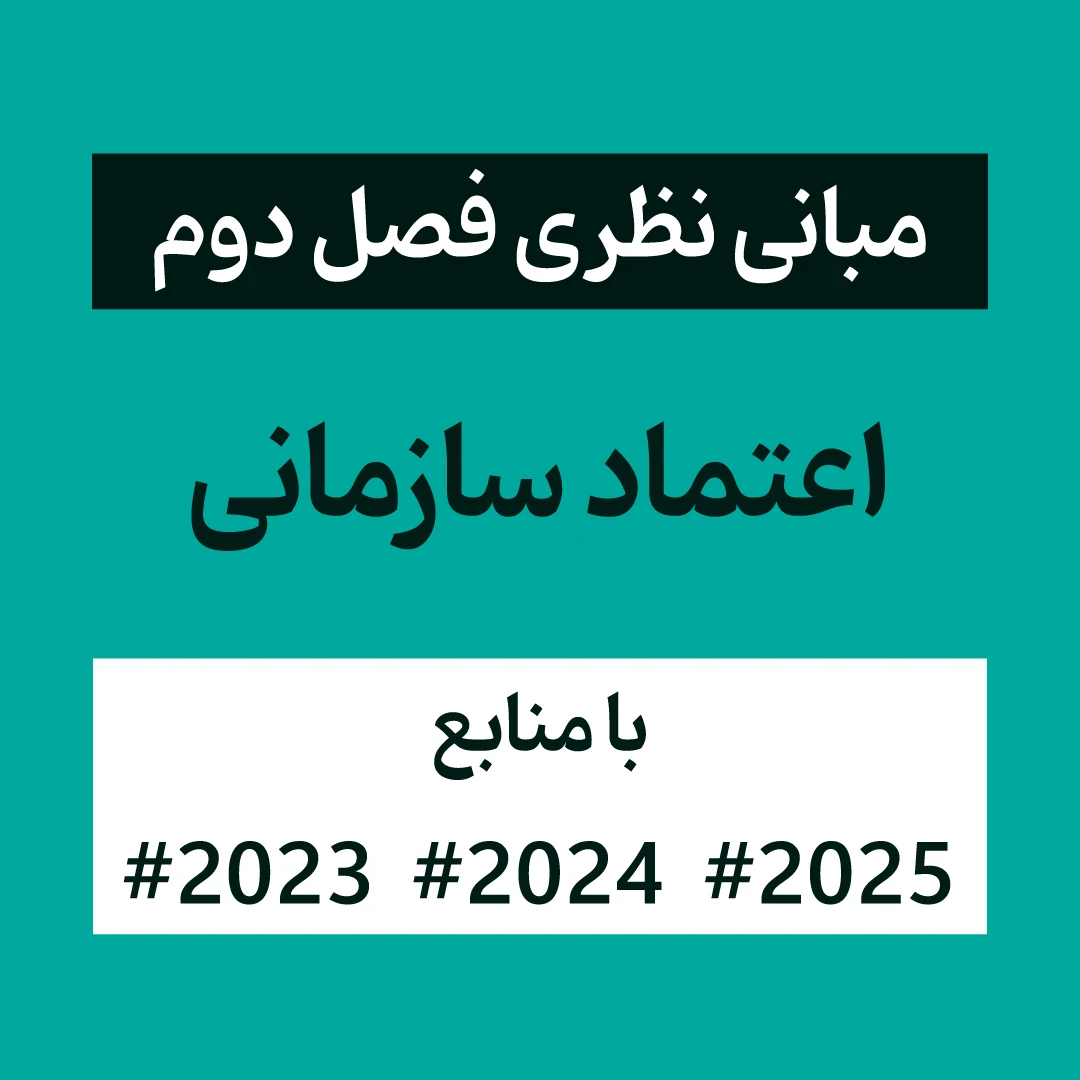
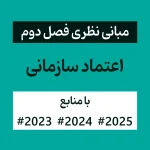
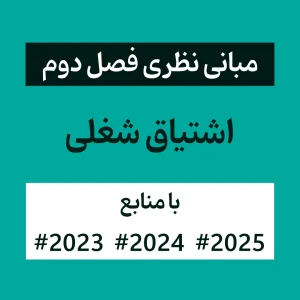
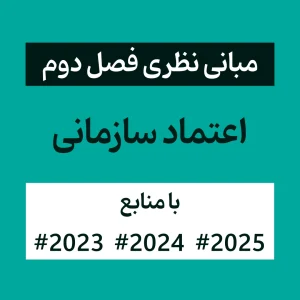
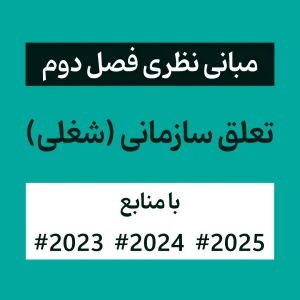
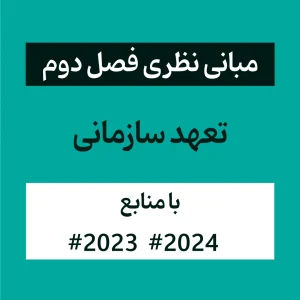
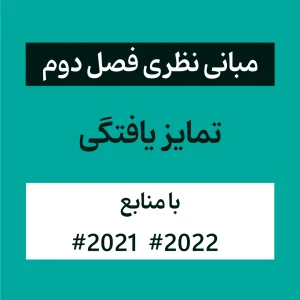

0دیدگاه